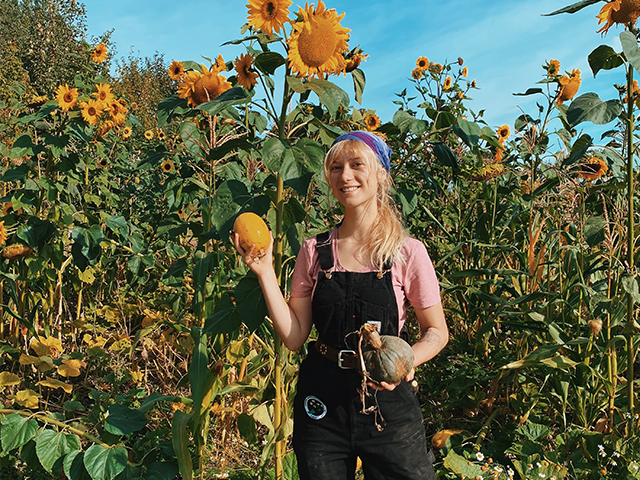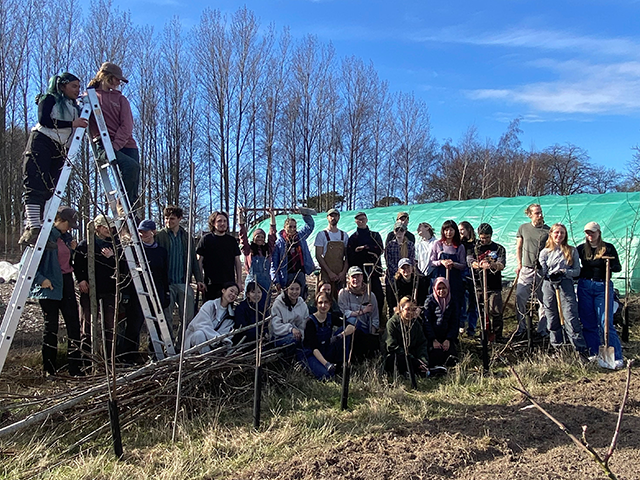Anyone who wants to develop and learn something new needs to experiment and test their limits. Alnarp’s Agroecology Farm, a cooperative farm on SLU’s Alnarp campus, was launched in 2021 by four frustrated students who felt that theoretical agroecology was not enough. The project has now grown into a non-profit organisation with four part-time employees and 300 volunteers. The farm is rated as one of the top 50 agroecology farms in the EU, and is in direct communication with the European Commission regarding the sustainable agriculture of the future.
“So many things in the world are dark right now. We need positive, shining examples that it is possible to make a difference when it comes to something as important as the food we eat every day,” says Marie-Claire Feller, Community Manager at Alnarp’s Agroecology Farm. The project was brand new when she began her master’s studies at SLU.
The farm’s location on the campus offers an invitation to combine cultivation with research projects. A master’s thesis has demonstrated that the health of the soil was measurably improved when the land was farmed according to agroecological principles, such as minimum tillage and with a diversity of crops. The results were presented to the world, including at the FAO World Food Forum in Rome in 2024.
In 2025, Alnarp’s Agroecology Farm was listed as one of Europe’s “Top 50 Farmers” on the platform of the same name. Top 50 Farmers aims to support and promote regenerative agriculture that leads the transition towards long-term sustainability.
“We need more farms like ours, to provide motivation and show young people what’s possible!”
A practice and a philosophy
Agroecology is both a way of farming and a way of thinking and living. A practice and a philosophy regarding the food sovereignty and resilience that can accompany small-scale and locally produced food. The goal is to achieve sustainable food systems, with both ecosystems in balance and social justice for the people involved in food production.
“Nicholas Jakobsson at SLU Holding was one of our earliest supporters, and has always encouraged us to follow the entrepreneurial spirit in what we do. He has introduced us to various networks, helped us negotiate for the land we use, and provided tips about where and how to apply for different forms of financial support,” says Marie-Claire.
With this support from SLU Holding, Alnarp’s Agroecology Farm has managed to obtain some funding for its courses and workshops. However, the farm is far too small and diversified to qualify for EU agricultural support for its actual production. Marie-Claire Feller notes that a great deal needs to change in society before it will be possible to receive payment for everything that agroecological farms contribute.
“We don’t have the conditions to become economically viable. The goal instead is for Alnarp’s Agroecology Farm to become an integral part of SLU’s structure, as an inspirational role model. For the time being, we want to be a safe haven for research and education, as well as a place for agroecological experimentation and for pushing boundaries. A place that future generations of passionate students will take over from those who have been equipped with both theoretical and practical knowledge and insights here.”
Alnarp’s Agroecology Farm currently sells its harvest from half a hectare of land to just over 80 households, which collect their prepaid boxes containing a variety of locally grown vegetables, fruits and flowers every week. Customers include SLU employees, families with children and elderly people living in the area around Lund and Malmö. Marie-Claire Feller views the future as a balance between large-scale and small-scale.
“The farms that are currently increasing in number in Sweden are the really large and the really small ones. Agroecological farming is probably best suited to locations like ours: on the outskirts of metropolitan areas, where there are many buyers who want to support projects of this type.”
A virtuous circle
One hope for the future is to integrate livestock into the production at Alnarp’s Agroecology Farm, and in the long term to be able to offer eggs and perhaps also meat.
“One amazing fact is that more than half of the students working here have no agricultural background, but want to get involved and learn. This makes our operation extremely interdisciplinary, and we believe that social change is best achieved across a broad front. Our project is about so much more than food. Everything is like a circle, where one thing leads to another,” says Marie-Claire.
And Alnarp’s Agroecology Farm has ended up in a virtuous circle. Contacts, networking and a considerable amount of voluntary work have led to the position they are in today.
“While I was studying for my bachelor’s degree in the Netherlands, I got involved in Youth Slow Food, and I kept in touch with a friend who went on to become president of Slow Food International. When they were invited to a Youth Policy Dialogue at the EU’s Directorate-General for Agriculture and Rural Development, I was approached.”
Europe’s agriculture is at stake
That’s just the way it is. When we speak, Marie-Claire has recently returned from meetings at the European Commission in Brussels. A key place for system-level change.
“It’s hard to know how much of an impression we’re really making, but when we meet with decision-makers, it feels like they’re taking our input seriously. The EU Commissioner for Agriculture has also promised to come and visit Alnarp’s Agroecology Farm, so I hope that will happen!”
Marie-Claire feels that there is a realisation at an EU level that we are now approaching many important and critical turning points.
“Europe’s agriculture is actually at stake, because half of the EU’s farmers will have retired ten years from now. If we don’t act forcefully to change the playing field – right now! – we will fail!”
However, the thing she perhaps still considers to be the greatest achievement so far is the very tangible impact Alnarp’s Agroecology Farm has on individuals.
“We have had trainees here who have been so inspired that they have started studying agroecology at SLU. We create social connections when we sell at markets and invite people to festivals. We have become a movement that really matters in people’s lives.”
Learn more about Alnarp’s Agroecology Farm
Alnarp’s Agroecology Farm (website)



